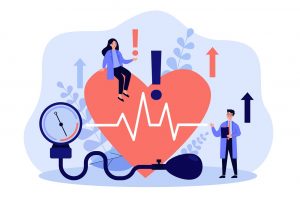
All the talk about COVID-19 and the growing list of “variants of concern” can take up a lot of health bandwidth. But it doesn’t mean that existing concerns and conditions have fallen by the wayside.
Hypertension, for example, is back in a big way. A new study is showing that hypertension control – the ability for individuals and medical professionals to get high blood pressure under control – has sharply worsened in the past half-decade.
The work was published in Hypertension, the journal of the American Heart Association. It shows that after years of progress in the area of hypertension control plateaued in 2009-2014 and had declined more than 10 percent by 2018.
Researchers cite multiple factors in the declining numbers. They found that hypertension awareness, treatment, and treatment efficacy were all worse now than before. They also said the quality of care had declined.
Hypertension control is working to keep blood pressure at a target of <140/<90 mmHg.
Researchers suggested doctors bore a substantial portion of responsibility by using single hypertensive treatments to treat multiple morbidities, like diabetes and obesity, that require specific treatments.
So, what can you do if your doctor isn’t properly treating your high blood pressure?
Unfortunately, you have to take your health into your own hands.
The first step is education. Learn about the risk factors for high blood pressure and how it can harm you. Take the initiative to book a doctor’s appointment so you can at least know what your blood pressure is.
If you are obese, diabetic, or concerned about these conditions, ask your doctor to recognize and treat each condition appropriately, without a one-size-fits-all approach.
Lastly, learn about the things you can to do get high blood pressure under control or prevent it from happening. In many cases, medication may be necessary, but treatment shouldn’t stop there.
Getting more exercise, eating more fruits, vegetables, whole grains, nuts, legumes, and lean proteins in place of processed foods, prioritizing sleep may all help you bring down elevated blood pressure.